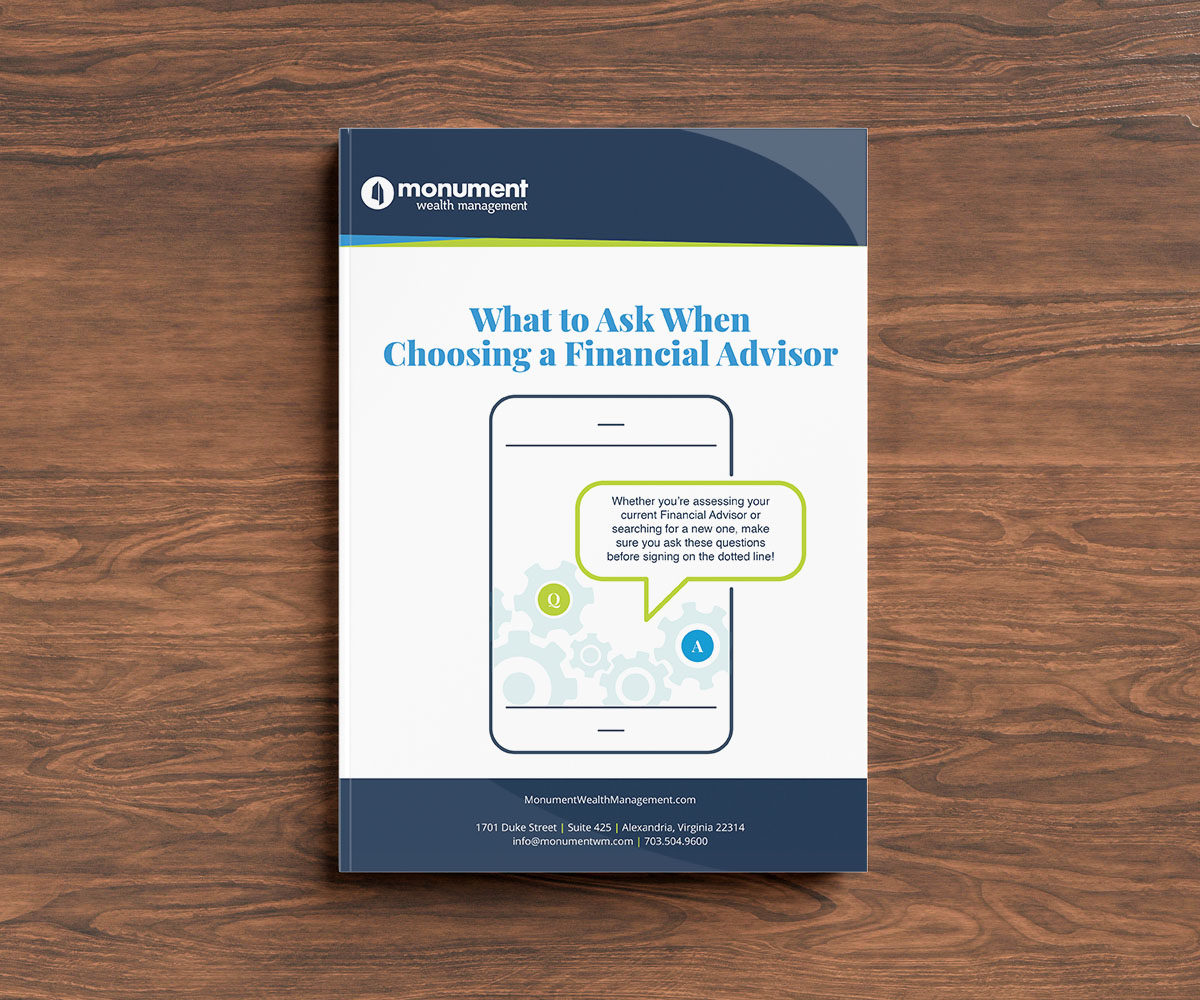Monument Wealth Management Articles
Understanding Wealth Management Fees

Share on your favorite platform, or by email
A few weeks ago, I turned on my car and heard a loud rattling noise. I turned to Google to help diagnose the problem. Of course, it could be a handful of things…some more urgent than others…but nothing I would attempt to fix on my own. It was time to call in the professionals.
I dropped my car off at the shop and waited anxiously for a call. When it came in, I was skeptical: Is that really the problem? Can I save money and get it done cheaper somewhere else? Are they taking advantage of my car-engine-ignorance? Can I trust them to tell it to me straight?
These are common questions that pop into our heads when we outsource parts of our precious lives to outsiders. However, it’s also why it’s imperative we find and hire professionals who are not only experts in their specialty, but also who we can TRUST.
That said, even if you trust your car mechanic, you should still understand the fees they charge for their expertise and know they are reasonable compared to the rest of the marketplace. Remember, you are paying fees based on the value you’re receiving through their expertise and service.
The same goes for your wealth manager.
As fiduciaries, we believe that wealth advisors should educate clients about their fees – without any B.S. We’re here to help you understand the basics about wealth management fees and equip you with questions to ask your financial advisor.
3 Types of Fees for Wealth Advisors
These are the common forms of compensation for wealth advisors (take note of what they are actually compensating the advisor FOR):
- Commission
- Fee-Only
- Fee-Based
Commissions
Wealth advisors paid through commissions (common at large Wall Street “Broker” firms and insurance agencies) are paid based on investment transactions. Commissions can be controversial because of a conflict of interest… they come with the risk of incentivizing advisors to buy and sell investments more frequently than necessary or recommending expensive products, which can result in higher fees for the client and higher pay for the advisor. Commissions aren’t always a bad thing – sometimes the product being recommended IS in your best interest given your unique circumstances. The problem is that a commission-based advisor is not required to recommend “the best” investment for you…they are only required to recommend a “suitable” investment for you.
It’s important that your advisor make recommendations not based merely on suitability, but investments based on your best interests while understanding YOUR big picture. Unfortunately, that doesn’t always happen in transactional relationships where advisors are compensated by commissions.
Fee-Only
Fee-only wealth advisors are typically referred to as “Registered Investment Advisor” firms, or “RIAs”. They charge a fee based on the advice they deliver.
This may be in the form of a flat fee, an hourly fee, or a percentage of your assets that they manage.
As people crave more wealth advice designed to help them meet their goals and objectives, they are increasingly eager to pay advisors for the expertise, advice, and value they deliver rather than simply being shown and sold some collection of third-party investment products managed as a “portfolio”.
Fee-Based
Fee-Based advisors are compensated with a combination of the two (often referred to as “Hybrid Advisors”). These hybrid advisors can switch back and forth between being a fiduciary and selling commission products. While there was an advantage to “hat changing” several years ago, changes in the marketplace have made almost all investments available outside of a commission structure. Advisors choosing to remain hybrid are choosing to retain the ability to charge their clients commissions.
That doesn’t make sense to us.
See this article for even more information on the types of financial advisors.

But wait. There’s more…
Some additional fees may be either added onto or “baked into” your Wealth Advisor’s fee. You’ll want to clarify this with your Advisor to make sure there are no surprises…
Fund Management Fees for Investment Managers
Some investment products have fees built into them, which can add up. These typically come into play when a wealth advisor allocates your assets to outside, third-party money managers or mutual funds. Fund management fees are also known as expense ratios, and they compensate the investment product manager. They are fees added on top of the fee you are paying your advisor
Service Fees for Financial Institutions
Service fees tend to be nominal and are a part of working with any bank or institution that holds your money. The fees compensate the institution where your money is held for their administrative assistance in things like transferring funds, processing account paperwork, creating and delivering statements, maintaining online account access, and tax reporting.
What Are Reasonable Wealth Management Fees?
If you’re paying a percentage of the assets the advisor is managing for you, Advisory HQ News Corp reported in 2021 that the average fee for a financial advisor’s services was 1.02% of assets under management (AUM) annually for an account of $1 million.
However, you’ll likely see fees that range from 0.5-1.5%. This is because the services financial advisors provide vary and cannot be compared apples to apples. Firms with more in-depth services and advice will often have a higher fee, and clients with a larger amount of assets will often have a lower percentage fee.
Think of it this way–while both a Honda and a Mercedes are cars with the same utility, they provide different value. It’s the same thing with wealth managers – what are you looking to pay for? Paying for utility is one thing, but what expertise, value, and advice do you seek?
If you are a successful professional with an overwhelmingly complex financial situation like many of our clients, wealth management may not be the best place to try to cut costs—not if you want the value of expertise that comes with an attentive, personal, long-term relationship with a credentialed professional. One who helps you co-create a Private Wealth Design that changes and adapts to meet your evolving wants and needs.
Is Paying for a Financial Advisor Worth It?
As you can see, in the financial industry, fees go by many names. But how do you know when a fee represents value? After all, paying a fee isn’t always a bad thing if you are deriving value from the advice. All professionals charge fees for their expertise and services, and in the wise words of my husband: “If it’s free, YOU are the product.”
Let me tell you a quick story about value and expertise:
There’s an old story about a broken ship engine that no one could seem to fix. Finally, after 10-15 different mechanics failed at getting the engine to start, an old mechanic went down to give it a try himself. He did a thorough inspection of the engine, took out a hammer, hit one spot, and fired it up. After a minute, the engine was running perfectly. The mechanic turned to the owner and said, “That will be $10,000” to which the owner said, “No way! You were here for five minutes!” The mechanic took out an invoice pad and wrote out an itemized bill:
Five minutes of tapping with a hammer: $2
Knowing where to tap: $9,998
Advisors can add value in many different ways:
- Providing trusted expertise and advice built off years of experience and industry credentials…rather than advice from your neighbor, Dan, at his backyard BBQ.
- Simplifying your life by removing the aggravation and hassle that comes with planning for and managing your own wealth.
- Properly framing all risk and providing clarity around your finances so you can make confident decisions.
- Helping you determine “What’s the money for?” and laying out a roadmap to help you to set and reach your financial goals.
- Preventing the all-too-common behavioral setbacks when it comes to making investment decisions in reaction to the “breaking news” of the moment.
More technically, Advisors also can help with:
- Executing on strategies to reduce your taxes as much as possible, including using certain tax-efficient vehicles and tax-loss harvesting.
- Periodically rebalancing your investment portfolio so it remains aligned with your goals and manages risk. [See Why Index Fund Investing Won’t Cut It]
- Reviewing your life insurance policies to make sure you’re appropriately covered.
- Working with you, your family, and your other legal and tax advisors to ensure a smooth wealth transfer to the next generation.
- Helping with complex situations, like diversifying concentrated stock for executives and preparing business owners for their business exit.
…and the list goes on.
Understanding your fees is the key to identifying what you are paying for and if those fees represent the level of expertise and value you expect.
Just as important as the value and expertise you seek is finding someone you can trust. Is your advisor a true, fee-only fiduciary, who is unconflicted by commissions and product sales and will put your interests above their own when handling your family’s wealth? ASK THEM. Some would say this peace of mind is simply priceless.

Ask About Your Wealth Management Fees
Every Advisor should be able to articulate their fees, the fees inside of any investment they recommend, and WHY the investment or service is in your best interest. If you’re not satisfied with the answers, and your advisor continues with smooth talk, sales pitches and financial jargon, reach out to our Team at Monument for a refreshing change.
Whether it’s your mechanic, your attorney, your wealth advisor, or anyone else…never hesitate to ask the fee question, and to demand the clarity that you deserve.
*Monument is a fee-only fiduciary with an in-house asset management team. Learn more about our Private Wealth Design process, how we manage investments, and who we work with, and reach out with any questions.

Don’t miss our article “What to Ask When Choosing a Financial Advisor”
Ready for straightforward, unfiltered
opinion and tailored advice for YOUR questions, not everyone else’s?
IMPORTANT DISCLOSURE INFORMATION
Please remember that past performance is no guarantee of future results. Different types of investments involve varying degrees of risk, and there can be no assurance that the future performance of any specific investment, investment strategy, or product (including the investments and/or investment strategies recommended or undertaken by Monument Capital Management, LLC [“Monument”]), or any non-investment related content, made reference to directly or indirectly in this blog will be profitable, equal any corresponding indicated historical performance level(s), be suitable for your portfolio or individual situation, or prove successful. Due to various factors, including changing market conditions and/or applicable laws, the content may no longer be reflective of current opinions or positions. Moreover, you should not assume that any discussion or information contained in this blog serves as the receipt of, or as a substitute for, personalized investment advice from Monument. To the extent that a reader has any questions regarding the applicability of any specific issue discussed above to his/her individual situation, he/she is encouraged to consult with the professional advisor of his/her choosing. No amount of prior experience or success should be construed that a certain level of results or satisfaction will be achieved if Monument is engaged, or continues to be engaged, to provide investment advisory services. Monument is neither a law firm nor a certified public accounting firm and no portion of the blog content should be construed as legal or accounting advice.
A copy of Monument’s current written disclosure Brochure discussing our advisory services and fees is available for review upon request or at www.monumentwealthmanagement.com/disclosures. Please Note: Monument does not make any representations or warranties as to the accuracy, timeliness, suitability, completeness, or relevance of any information prepared by any unaffiliated third party, whether linked to Monument’s website or blog or incorporated herein, and takes no responsibility for any such content. All such information is provided solely for convenience purposes only and all users thereof should be guided accordingly.
Historical performance results for investment indices, benchmarks, and/or categories have been provided for general informational/comparison purposes only, and generally do not reflect the deduction of transaction and/or custodial charges, the deduction of an investment management fee, nor the impact of taxes, the incurrence of which would have the effect of decreasing historical performance results. It should not be assumed that your Monument account holdings correspond directly to any comparative indices or categories. Please Also Note: (1) performance results do not reflect the impact of taxes; (2) comparative benchmarks/indices may be more or less volatile than your Monument accounts; and, (3) a description of each comparative benchmark/index is available upon request.
Please Remember: If you are a Monument client, please contact Monument, in writing, if there are any changes in your personal/financial situation or investment objectives for the purpose of reviewing/evaluating/revising our previous recommendations and/or services, or if you would like to impose, add, or to modify any reasonable restrictions to our investment advisory services. Unless, and until, you notify us, in writing, to the contrary, we shall continue to provide services as we do currently. Please Also Remember to advise us if you have not been receiving account statements (at least quarterly) from the account custodian.